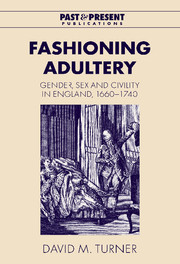Book contents
- Frontmatter
- Contents
- Acknowledgements
- Note on the text
- List of abbreviations
- Introduction
- 1 Language, sex and civility
- 2 Marital advice and moral prescription
- 3 Cultures of cuckoldry
- 4 Sex, death and betrayal: adultery and murder
- 5 Sex, proof and suspicion: adultery in the church courts
- 6 Criminal conversation
- Conclusion
- Bibliography
- Index
- Past and Present Publications
6 - Criminal conversation
Published online by Cambridge University Press: 01 July 2009
- Frontmatter
- Contents
- Acknowledgements
- Note on the text
- List of abbreviations
- Introduction
- 1 Language, sex and civility
- 2 Marital advice and moral prescription
- 3 Cultures of cuckoldry
- 4 Sex, death and betrayal: adultery and murder
- 5 Sex, proof and suspicion: adultery in the church courts
- 6 Criminal conversation
- Conclusion
- Bibliography
- Index
- Past and Present Publications
Summary
The term ‘criminal conversation’ was one of the most evocative means of describing adultery in early eighteenth-century England. It was also the name given to a new form of civil action brought to the courts of King's Bench or Common Pleas, by which a cuckolded husband could sue his wife's lover for the ‘loss of comfort and society’ he had suffered by the infidelity. If adultery could be adequately proved, he could claim damages for the insult to his honour, or the mental disquiet he had suffered. It did not automatically lead to a separation (which still had to be sued for in the church courts), nor did it provide any answers to the problem of remarriage after adultery for the innocent party. Yet it did offer injured husbands a potentially powerful means of revenging themselves by inflicting financial humiliation on their rivals.
Emerging during the late seventeenth century at a time when the costs of waging law were increasing, this response to infidelity was slow to catch on, being prohibitively expensive for the majority of men. Stone has calculated that between 1680 and 1740 there were only twenty-three recorded cases of criminal conversation (or crim. con. as it was popularly known) brought to trial. He has therefore categorised the period before 1760 as an ‘era of stagnation’ in the development of the action, standing in marked contrast to the explosion of cases in the closing decades of the eighteenth century.
- Type
- Chapter
- Information
- Fashioning AdulteryGender, Sex and Civility in England, 1660–1740, pp. 172 - 193Publisher: Cambridge University PressPrint publication year: 2002

